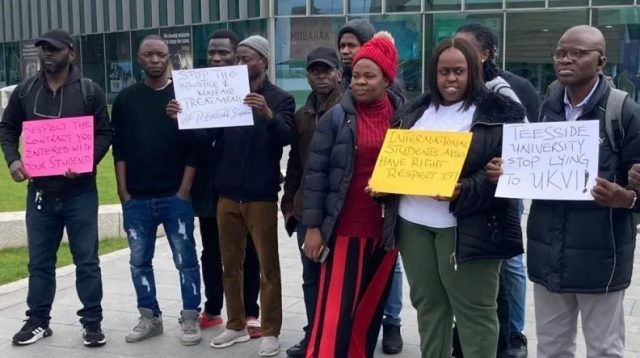Teesside University in the United Kingdom, UK has expelled several Nigerian students and initiated their deportation over unpaid fees, citing compliance with UK immigration regulations.
The university emphasised its commitment to visa issuance and compliance obligations.
A spokesperson for the university said: “Teesside University is proud to be a global institution with a diverse student population but is also very aware of its visa issuance and compliance obligations.
These strict external regulations ensure that the university fully supports a robust immigration system and are outside of the university’s control.”
The university explained that it had “no choice” but to enforce these measures as non-payment of fees constituted a breach of visa sponsorship rules. Efforts were reportedly made to assist the affected students through bespoke payment plans.
However, many of the expelled students protested outside the campus of the institution on Tuesday, accusing the university of being “heartless” and unfair.
Adenike Ibrahim, one of the affected students, expressed her frustration to the BBC, revealing that she was close to submitting her dissertation when she was removed from her course due to an inability to make a payment.
Despite having since paid her fees in full, Ibrahim now faces deportation along with her young son and cannot re-enroll.
“I did default [on payments], but I’d already paid 90 per cent of my tuition fees, and I went to all my classes,” she said. “I called them and asked to reach an agreement, but they do not care what happens to their students.”
Another student, Esther Obigwe, shared her experience of trying to communicate her financial struggles to the university without success until she too was barred from her studies and received a notice to leave the UK
“I attended all of my classes and seminars, I’m a hell of an active student,” Obigwe said. “It is disheartening, I am now on antidepressants and being here alone, I have nobody to talk to. For over two months, I’ve barely eaten or slept and I don’t understand why this is being meted at us, we didn’t do anything wrong.” She added that most of the students had “spent a lot of money to be here.”
Jude Salubi, who was studying to become a social worker, recounted how he was midway through a placement when his access to the university was suspended, and he was told to leave the country.
Salubi had been working 18 hours each weekend in Liverpool to try and pay off his fees. “As of now I have paid £14,000 and have a balance of £14,000,” he said. “I am willing to come to an agreement as to how I will make this payment, but I need guarantees that I will be re-enrolled into school and my visa restored.”
Responding to the development, the UK Home Office stated that the decision to offer or withdraw visa sponsorship rests with the sponsoring institution.
When a visa is shortened or cancelled, individuals must “take steps to regularise their stay or make arrangements to leave the UK.” The Home Office informed the students that they had no right to appeal.
However, a delegation led by a representative of the Nigerian Embassy in the UK, Ambassador Christian Okeke, along with leaders of the Nigerian Students Union in the UK, will meet with the university’s management to seek a resolution.
This decision follows a virtual meeting chaired by the Chairman of the Nigerians in Diaspora Commission, Abike Dabiri-Erewa, and attended by Okeke, the President of the Nigerian Students Union UK, Yemi Soile, and several affected students.
The NiDCOM spokesperson, Abdur-Rahman Balogun, confirmed the planned intervention in a statement on Wednesday.
According to Balogun, during the meeting, the students described their experiences and expressed hope for a favourable outcome.
Dabiri-Erewa urged the students “to remain calm and not to take the law into their own hands.”
She appealed to Teesside University to treat the students fairly and justly.









